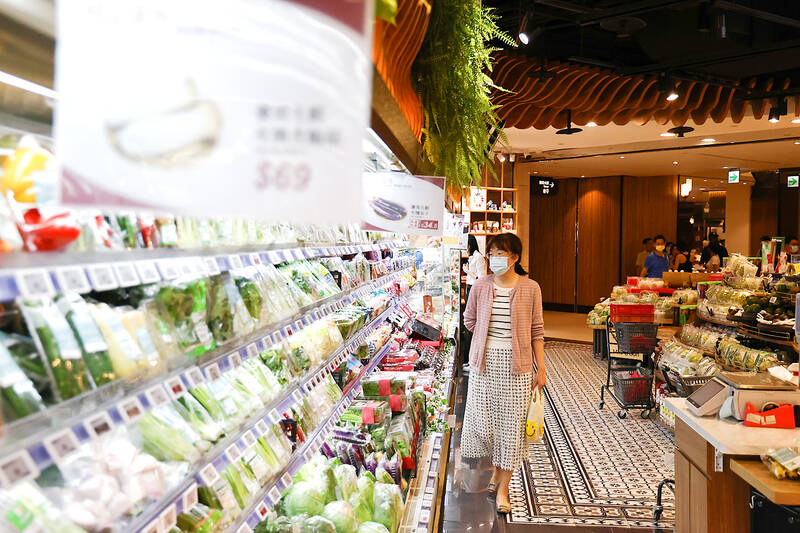The Directorate-General of Budget, Accounting and Statistics (DGBAS) yesterday raised its growth forecast for Taiwan’s consumer price index (CPI) this year to 2.03 percent ahead of electricity rate hikes next month.
The DGBAS’ forecast was up from 1.85 percent last month, and came as the central bank upgraded its estimate to 2.16 percent from 1.89 percent last week, after the Ministry of Economic Affairs announced an average 11 percent increase in electricity rates.
The increase works out to about NT$3.4518 per kilowatt-hour (kWh) for households and industrial users.

Photo: CNA
Also last week, the central bank announced a surprise interest rate hike of 12.5 basis points, which raised the benchmark discount rate to 2 percent, as the monetary policymaker aimed to tackle growing inflationary pressure.
The increase in electricity rates is unlikely to have much of an impact on inflation, as the hikes are specific to certain levels of power usage, Taiwan Institute of Economic Research (TIER, 台灣經濟研究院) economist Fang Chun-te (方俊德) said.
For example, the increase for most small vendors would be about 5 percent, which is unlikely to affect consumer prices significantly, Fang said.
“Despite the average 11 percent hike, small vendors would not have to shoulder a heavy financial burden,” Fang said. “I do not think they will aggressively raise product prices to pass on the additional costs to consumers.”
Moreover, about 60 percent of the small shops in Taiwan use less than 700kWh of power per month, meaning their electricity bills would only increase 3 percent, he said.
Only about 20 percent of vendors in Taiwan consume 701kWh to 1,500kWh per month, which would translate to an approximate 5 percent increase in their electricity bills, Fang said.
In the industrial sector, about 440,000 companies could expect an electricity rate hike of about 14 percent, while those that consume more than 500 gigawatt-hours a year would face an increase of about 25 percent, he said.
As most companies in the industrial sector are exporters, they would most likely pass on their additional costs to foreign clients rather than local consumers, Fang said.
Under the new power rate adjustments, households that consume up to 330kWh per month would face a 3 percent rate hike, while those that use 331kWh to 700kWh a month would see a 5 percent increase, he said, adding that hose households account for about 93 percent of all households in Taiwan.
“Therefore, I think that the latest power rate hikes will raise CPI growth by less than 0.4 percentage points this year” to more than 2 percent, Fang said.
TIER is scheduled to update its forecast next month.
In January, the think tank predicted CPI would grow 1.95 percent this year.

Among the rows of vibrators, rubber torsos and leather harnesses at a Chinese sex toys exhibition in Shanghai this weekend, the beginnings of an artificial intelligence (AI)-driven shift in the industry quietly pulsed. China manufactures about 70 percent of the world’s sex toys, most of it the “hardware” on display at the fair — whether that be technicolor tentacled dildos or hyper-realistic personalized silicone dolls. Yet smart toys have been rising in popularity for some time. Many major European and US brands already offer tech-enhanced products that can enable long-distance love, monitor well-being and even bring people one step closer to

MAJOR BENEFICIARY: The company benefits from TSMC’s advanced packaging scarcity, given robust demand for Nvidia AI chips, analysts said ASE Technology Holding Co (ASE, 日月光投控), the world’s biggest chip packaging and testing service provider, yesterday said it is raising its equipment capital expenditure budget by 10 percent this year to expand leading-edge and advanced packing and testing capacity amid strong artificial intelligence (AI) and high-performance computing chip demand. This is on top of the 40 to 50 percent annual increase in its capital spending budget to more than the US$1.7 billion to announced in February. About half of the equipment capital expenditure would be spent on leading-edge and advanced packaging and testing technology, the company said. ASE is considered by analysts

TRANSFORMATION: Taiwan is now home to the largest Google hardware research and development center outside of the US, thanks to the nation’s economic policies President Tsai Ing-wen (蔡英文) yesterday attended an event marking the opening of Google’s second hardware research and development (R&D) office in Taiwan, which was held at New Taipei City’s Banciao District (板橋). This signals Taiwan’s transformation into the world’s largest Google hardware research and development center outside of the US, validating the nation’s economic policy in the past eight years, she said. The “five plus two” innovative industries policy, “six core strategic industries” initiative and infrastructure projects have grown the national industry and established resilient supply chains that withstood the COVID-19 pandemic, Tsai said. Taiwan has improved investment conditions of the domestic economy

Malaysia’s leader yesterday announced plans to build a massive semiconductor design park, aiming to boost the Southeast Asian nation’s role in the global chip industry. A prominent player in the semiconductor industry for decades, Malaysia accounts for an estimated 13 percent of global back-end manufacturing, according to German tech giant Bosch. Now it wants to go beyond production and emerge as a chip design powerhouse too, Malaysian Prime Minister Anwar Ibrahim said. “I am pleased to announce the largest IC (integrated circuit) Design Park in Southeast Asia, that will house world-class anchor tenants and collaborate with global companies such as Arm [Holdings PLC],”